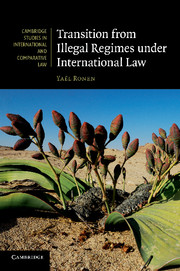Book contents
- Frontmatter
- Contents
- Abbreviations
- Acknowledgements
- Foreword
- Table of treaties
- Table of case law
- Table of UN documents
- Table of domestic legislation and similar acts
- Table of documents of intergovernmental organizations
- 1 Introduction
- 2 The case studies
- 3 The obligation of non-recognition
- 4 The effect of transition on treaty relations of the territory
- 5 The effect of transition on the domestic law of the territory
- 6 The effect of transition on settlers implanted by illegal regimes
- 7 The effect of transition on land titles
- 8 Conclusions: Non-recognition and transition
- Selected bibliography
- Index
- References
5 - The effect of transition on the domestic law of the territory
Published online by Cambridge University Press: 05 July 2011
- Frontmatter
- Contents
- Abbreviations
- Acknowledgements
- Foreword
- Table of treaties
- Table of case law
- Table of UN documents
- Table of domestic legislation and similar acts
- Table of documents of intergovernmental organizations
- 1 Introduction
- 2 The case studies
- 3 The obligation of non-recognition
- 4 The effect of transition on treaty relations of the territory
- 5 The effect of transition on the domestic law of the territory
- 6 The effect of transition on settlers implanted by illegal regimes
- 7 The effect of transition on land titles
- 8 Conclusions: Non-recognition and transition
- Selected bibliography
- Index
- References
Summary
When pleading the case for an obligation of non-recognition of South Africa's acts in Namibia, the UN Secretary-General noted that
It will be the prerogative of the future Legislative Assembly of Namibia … to decide whether, and to what extent, to recognize or validate any act undertaken under void laws during the illegal South African presence, or to grant retroactive validation to any such law having an otherwise acceptable content.
The present chapter examines whether the Secretary-General's statement, that the post-transition regime enjoys the prerogative of validating acts of the illegal regime or rejecting them, was correct as a matter of law and practice. Like the Secretary-General, this chapter focuses on law of the illegal regime which has acceptable content and would have been valid if it were not for the illegality of the regime.
Doctrine
The post-transition regime's freedom of action
The obligation of non-recognition is aimed at preventing the consolidation of the illegal regime in the territory. Its raison d'être disappears once the illegal regime comes to an end. Since the underlying rationale for the obligation is ultimately the protection of the rights of the lawful regime, it is untenable that these rights should be prejudiced by the illegality of the previous regime any more than they should be prejudiced by its effectiveness.
- Type
- Chapter
- Information
- Transition from Illegal Regimes under International Law , pp. 159 - 185Publisher: Cambridge University PressPrint publication year: 2011



